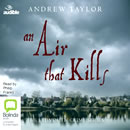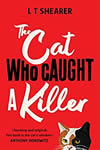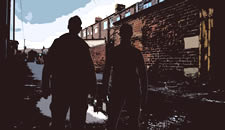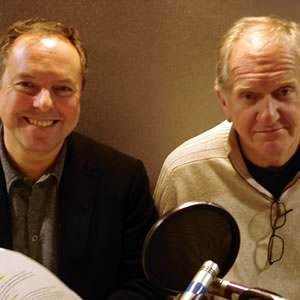« Living | Main | Christmas »
Wednesday November 30, 2022
Books in November
- An Air That Kills Andrew Taylor [read by Philip Franks]
 Suffering from deprivation of Marwood and Lovett, I decided to try a previous series - removed from the Ashes of London by a couple of hundred years. Anyway, I love it so much, I think I can now count Andrew Taylor as one of my new favourite authors.
Suffering from deprivation of Marwood and Lovett, I decided to try a previous series - removed from the Ashes of London by a couple of hundred years. Anyway, I love it so much, I think I can now count Andrew Taylor as one of my new favourite authors.
The Lydmouth books were written in the 1990s - much earlier in Taylor's writing career. They are set post-WW2 in a very clearly described period of change. Our protagonists are a policeman new to the area, and a young "career woman" - both of them have similar issues in finding their places not only in the local community but also in society in general. Those who used to be controlling forces in village life, ex-military officers, those with titles, landowners etc while not the force they once were (many in reduced financial circumstances), still believe they can exert influence and attempt to enforce their views on "the lower orders". Policemen (especially in-comers), and women, should know their place.
These two - similar to Marwood and Lovett - do not really have any kind of relationship in the book - just more of an interaction. Their lives are described essentially separately, which I particularly like. (They do not develop into Steed and Mrs Peel).
I was so enamoured of the book that I immediately wanted to move on to the next in the series. However, one thing I enjoyed was that the story is set in November, and the description of the weather and so on are totally in keeping with the time in which I am reading it. The next book seems to be set in June, so I am going to defer reading it until the season turns....!
Other readers like me, moving on from the 18th century stories, have mentioned finding it disappointing - but far from it for me. I think perhaps they liked the "Georgette Heyer" model of historical novels, unfavourably comparing the dismal backdrop of the 1950's and the not-always-likeable characters. However, I am fascinated by this period and feel he writes about it, and the people living in it with great realism and perception. [One reader says they prefer the "historical" novels which made me smile as I need to point out that although it's also only yesterday to me, the 1950's are three-quarters of a century ago...]. -
The Cat Who Caught a Killer by L T Shearer
 If you love cats and the so-called cosy crime genre (as I do) you will enjoy this book. It's not a demanding read and would provide perfect travel reading - especially if you were off for a weekend in London, as the protagonist (Lulu) lives on a canal boat and so the book includes picturesque descriptions of, and information about, the area around Little Venice.
If you love cats and the so-called cosy crime genre (as I do) you will enjoy this book. It's not a demanding read and would provide perfect travel reading - especially if you were off for a weekend in London, as the protagonist (Lulu) lives on a canal boat and so the book includes picturesque descriptions of, and information about, the area around Little Venice.
As many other readers have commented, the calico cat of the title does somewhat steal the show, and since it is revealed in the opening pages, I don't think it's a spoiler to say that the cat has the power of human speech. "Conrad" as Lulu names him, is not at all twee, but rather a sensible, down-to-earth and serious character - and despite there being no real hint of this in the text, I was also driven to wonder if his vocalisations were more an expression of Lulu's loneliness after the loss of her husband, since (again realistically) no-one else ever hears anything other than cat language. However, despite never hearing Conrad speak in actual words, all the other human characters are immediately captivated when they meet him - as I'm sure you will be too.
[Although this book is definitely not a comedy, I could not help but be reminded of Lynne Truss's hilarious books about the Evil Talking Cats (ETCs). (Note: Conrad is definitely not one of those).]  Trueman and Riley
Trueman and Riley
Two bickering detectives solve Yorkshire's trickiest cases. The duo began life in a BBC Radio 4 play in 2002, with DI Trueman called back to work after a nervous breakdown in order to solve a high profile murder case, backed up by Detective Superintendent Riley. This was followed by three further crime dramas in 2005.

I thought this was an excellent radio drama series, with short episodes, involving amusing and interesting yet everyday police cases. I listened to all 3 series and a prequel. It's presented in the highly professional manner heard in the early radio dramas (before TV) with a minimal cast used to great effect. The actors work well together seemingly with real rapport - as do the characters they depict.
Robert Daws and Duncan Preston - both exceedingly well known actors from TV - star as Trueman and Riley, and the director is Toby Swift.
Posted by Christina at 12:37 PM. Category: Books of the Month
